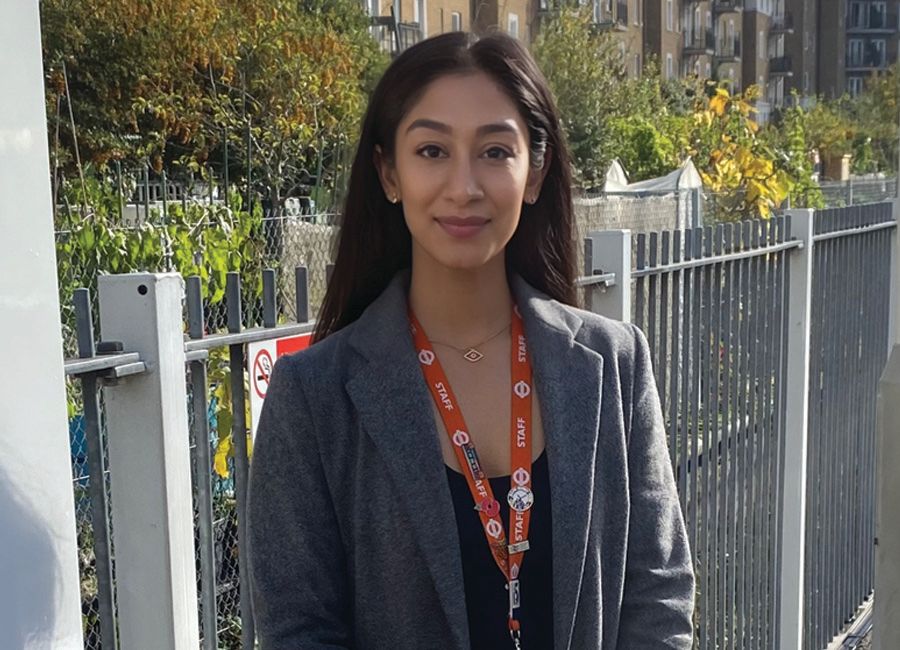VALUE ADDED
New role will help show how we bring real value to the communities we serve

It’s not just our train services that make us an important part of life for Londoners.
For decades, we’ve also been at the heart of communities, whether by hosting activities in and around stations, offering career opportunities for local people, or through colleagues supporting good causes.
Our impact away from the tracks has been immeasurable – but what if we could measure it?
Quantifying that impact is one of the reasons Arriva Rail London has appointed a social value manager. It’s part of a strategy to maximise the positive impact we have on communities, the environment and local economies.
Shivani Hill
Shivani Hill
Having worked in the transport industry for 13 years with Network Rail and ARL, Shivani Hill took up the post of social value manager in August 2023. She will be supported by colleagues already in the business and new recruits such as environment advisor Natasha Doole.
“Social value is all about what we do to leave behind a better world for future generations,” Shivani explains. “How we give back to the local communities we serve, how we are helping to achieve biodiversity, our journey to net zero CO2, and how we operate responsibly as a business.
“Of course, the company already does a huge amount of this work, but my role is about understanding where we can make a step change with the current resources and expertise we have and how we can better demonstrate our value.”


Measurable value
One of the first steps has been to bring in expert advisors, who use a complex framework to calculate a measurable value for all our work with a potential social benefit.
“You can apply it to a project, for example, Hackney Central,” says Shivani. “You can put information into the portal – such as hiring apprentices on the job, improving access for people with reduced mobility and using sustainable materials – and it will tell you that you created X pounds worth of social value on that project.”
Replicated across all the work we do every day, that will add up to a definitive figure offering measurable evidence of the benefit we bring.
Shivani adds: “Now more than ever, commissioners want to know how responsible and sustainable businesses are. Customers are also making conscious decisions about how they travel, how they buy, what they wear, what they eat and where it comes from. We need to demonstrate where we are on that journey.”
The concept of social value is wide-ranging. As well as the examples above, it includes areas such as recruitment, outreach, community engagement, health and wellness and responsible procurement.
“Responsible procurement is an area that we are developing, and it will be a real step change in our relationship with suppliers and how we do business,” says Shivani.
“For example, if we purchase electric cars, that’s contributing to net zero. But we will look beyond that and consider things like where the cars are built and shipped from. Do they use batteries that are ethically sourced?
“It works on the smallest scale, too – if we get cakes for a local event, are we supporting a local independent bakery? As well as being sustainable ourselves, we're also managing that sustainability throughout our supply chain and working with partners that have the same values as us.”


Reflecting communities
The role will also tie in with the significant work we are already doing around equality, diversity and inclusion (ED&I). It will help us demonstrate the progress made in creating an inclusive culture and show that we offer opportunities to a diverse group of people, reflective of the communities we serve.
“ARL’s Culture Review report has shown how we can improve, and with our social value strategy, we have the opportunity to look at ED&I holistically. For example, ARL is striving to improve and provide opportunities for internal progression, but alongside this we are creating an outreach programme to attract diverse talent to ARL and the wider railway industry in the coming years.”
Ultimately, the role’s success will rely on colleagues across the business continuing to deliver excellent service for customers and engaging with their communities. And where this work has the potential to make a difference, the company will provide support to do more.
“We want to provide the tools colleagues need to get involved with charities or local schools,” says Shivani. “We already have a Community Improvement Fund to match third-party funding for improvements around stations, and our new charity scheme has seen Paul Elliot and David Cranstoun secure £1,000 for charities they are passionate about.
“The more opportunities for this type of work colleagues can let us know about and get involved with, the more we can build our social value. We can show we are more than just a train operator that gets you from A to B; we also add value to our people and the communities we serve.”





